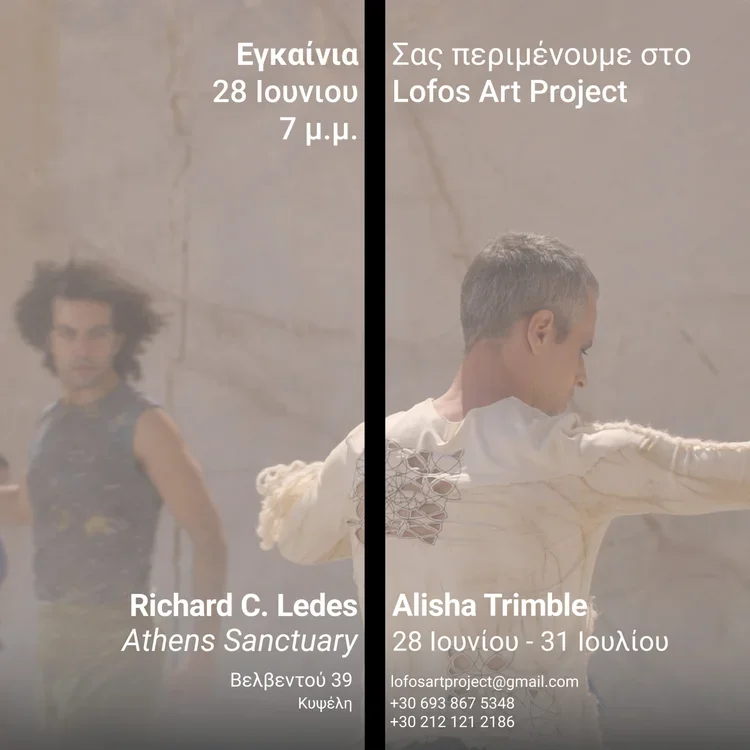
NO HUMAN IS ILLEGAL
a Film by Richard C. Ledes
“The most beautiful thing on the black earth...is what you love”
A personal encounter with the world of the refugees detained on the Greek island of Lesvos.
Director’s Statement
Faten Shahoud, a Syrian refugee, whom we interviewed on the Greek island of Lesvos, wants her son to walk again. The twelve-year-old needs an operation to repair his shattered leg.
Looking directly into our lens, Abdul Razzak Zarzur tells us that he saw his family, friends and neighbors shot as they attempted to escape Syria. Most died at the Turkish border.
Nadia Essa, her daughter and husband nearly drowned in the Aegean Sea before the crammed, rubber boat made landfall on Lesvos. Her husband’s trauma is so severe that he can no longer speak, only sing. He does sing for us.
Ahmad al-Hamawi says he just wants help getting to Germany so he can see his son again before he dies...
Many tell us about October 28th — the date a wooden boat carrying over three hundred people sank in less than one minute.
NO HUMAN IS ILLEGAL. This documentary that surprised me by making me discover more of the story of my father’s family follows our small group of filmmakers with our various complimentary assignments as we interview the people who fled their homes—mainly Arab and Kurdish-speaking Syrian people. They became refugees—or undocumented migrants—and are currently detained on the Greek island of Lesvos, also known as Mytilene. They are waiting for the European Union to decide their fate. Either they will be allowed to stay in Europe or they will be or deported back to Turkey.
Half of our small crew were women. This, no doubt, accounts for the number of women migrants who were willing to speak with us. We also interview the residents of Lesvos, a UN representative stationed on the island, and a cross section of international volunteers who have a range of motivations. The film was shot by Italian cinematographer Valentina Caniglia. Rather than speaking without translation in languages most Europeans and Americans don’t understand, we wanted to give the people space, both literally and figuratively, to tell their personal stories. Valentina’s beautiful work in CinemaScope brings out the tragic contrast between the beauty of the island and the situation of these people seeking safety for themselves, for their families.
We filmed on one of the margins of Europe, but what is happening here is central to the future of Europe, and of the world.
Richard C. Ledes
No Human is Illegal (2018)
Synopsis
Completed in 2018 and filmed entirely on the Greek island of Lesvos, NO HUMAN IS ILLEGAL is a documentary about what is perhaps one of the darkest and most seminal political historical events of the start of the 21st century: the founding of a zone of exclusion within the Eurozone.
The spring of 2018 marked the second anniversary of the European Commission, the ruling body of the Eurozone, radically revising its policy regarding undocumented migrants arriving on the Aegean islands of Greece. At that time the European Commission declared undocumented migrants arriving on the Aegean islands would be sent back to Turkey.
Filmmaker Richard C. Ledes and his small crew arrived a few weeks later on the island of Lesvos—the main point of entry from Turkey into Europe. They began interviewing asylum seekers, mainly from Syria but from elsewhere as well, experiencing for the first time being detained indefinitely in Europe or deported to Turkey. The filmmaker connects his own family's experience as Pontian Greeks who left Turkey for the United States as refugees in the 1920s to the current situation of asylum seekers on the island. Through stunning cinematography of the island's natural beauty and archaeological ruins shot by Italian cinematographer Valentina Caniglia, Ledes connects the island's literary and historical importance in ancient Greece to the current conditions of refugees and the importance to Europe of what is happening to these people detained on its borders.
These poetic and political leaps combined the compassion of the volunteers, the conflicting responses of the people living on the island and the testimony of the refugees themselves create a vital record of this major confrontation between Europe's ideals and its current choices.
Crew
Richard C. Ledes
Director, Producer
Director of Photography
Valentina Caniglia, AIC
Francois Moutin & Louis Moutin
Original Score
Pete Street
Editor
M. Trevino
Contibuting Editor
Florina Titz
Associate Producer & Assistant to the Director
Richard C. Ledes
Narrated by







